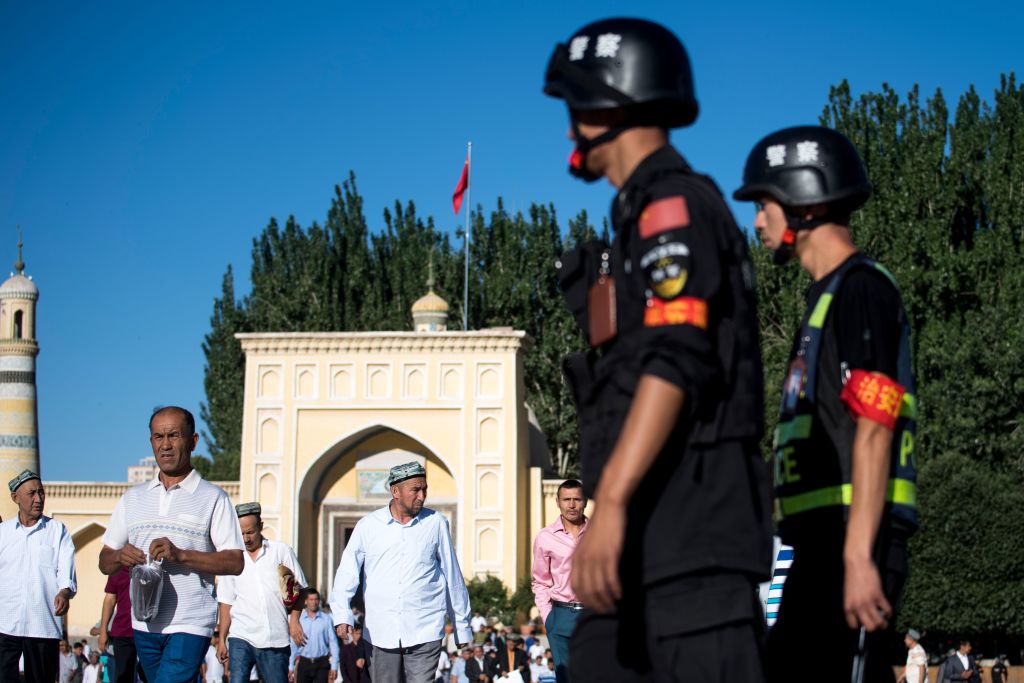China may have recently demolished a Uighur mosque as old as Notre Dame


A free daily email with the biggest news stories of the day – and the best features from TheWeek.com
You are now subscribed
Your newsletter sign-up was successful
Much of Paris' Notre Dame cathedral, started in 1163, survived Monday's tragic conflagration. But it's not clear anything remains of the 780-year-old Keriya mosque in China's western Xinjiang province.
Last week, Shawn Zhang, a law student in Canada, posted satellite images suggesting that the Chinese government had demolished the Keriya mosque, believed to date back to 1237. Zhang has used Chinese government documents and open-source satellite images to reveal a huge network of government internment camps for Uighers and other ethnic Muslim minorities in Xinjiang.
A United Nations report says China has turned Xinjiang "into something that resembled a massive internment camp shrouded in secrecy, a 'no rights zone,'" Reuters reported in November. A month earlier, America's U.N. ambassador, Nikki Haley, called the imprisonment of "at least a million Uighurs and other Muslim minorities" in "so-called 're-education camps'" something "straight out of George Orwell." China tightly controls access to the region, Reuters reports, but "mosques across Xinjiang are now adorned with Chinese flags and banners exhorting people to 'Love the Party, Love the Country.' During Friday prayers, the mosques are almost empty."
The Week
Escape your echo chamber. Get the facts behind the news, plus analysis from multiple perspectives.

Sign up for The Week's Free Newsletters
From our morning news briefing to a weekly Good News Newsletter, get the best of The Week delivered directly to your inbox.
From our morning news briefing to a weekly Good News Newsletter, get the best of The Week delivered directly to your inbox.
That's a recent development, says Rachel Harris, who studied the Uighurs in Xinjiang for a decade. "After the Cultural Revolution, Uighur and Kazakh Muslims began to reconnect with their faith," revitalizing old mosques, she writes in The Guardian. The Keriya mosque is one of hundreds China has reportedly destroyed in Xinjiang, and "whole cities are being redesigned to facilitate maximum security and surveillance of the local population."
Much of the Old Town section of Kashgar, "once considered one of the best-preserved sites of traditional Islamic and Central Asian architecture in the region," is being razed or repurposed for Han Chinese tourists, Reuters says. "One mosque has been transformed into a trendy hookah lounge and bar serving shisha tobacco and alcohol."
A free daily email with the biggest news stories of the day – and the best features from TheWeek.com
Peter has worked as a news and culture writer and editor at The Week since the site's launch in 2008. He covers politics, world affairs, religion and cultural currents. His journalism career began as a copy editor at a financial newswire and has included editorial positions at The New York Times Magazine, Facts on File, and Oregon State University.
-
 How the FCC’s ‘equal time’ rule works
How the FCC’s ‘equal time’ rule worksIn the Spotlight The law is at the heart of the Colbert-CBS conflict
-
 What is the endgame in the DHS shutdown?
What is the endgame in the DHS shutdown?Today’s Big Question Democrats want to rein in ICE’s immigration crackdown
-
 ‘Poor time management isn’t just an inconvenience’
‘Poor time management isn’t just an inconvenience’Instant Opinion Opinion, comment and editorials of the day
-
 Nobody seems surprised Wagner's Prigozhin died under suspicious circumstances
Nobody seems surprised Wagner's Prigozhin died under suspicious circumstancesSpeed Read
-
 Western mountain climbers allegedly left Pakistani porter to die on K2
Western mountain climbers allegedly left Pakistani porter to die on K2Speed Read
-
 'Circular saw blades' divide controversial Rio Grande buoys installed by Texas governor
'Circular saw blades' divide controversial Rio Grande buoys installed by Texas governorSpeed Read
-
 Los Angeles city workers stage 1-day walkout over labor conditions
Los Angeles city workers stage 1-day walkout over labor conditionsSpeed Read
-
 Mega Millions jackpot climbs to an estimated $1.55 billion
Mega Millions jackpot climbs to an estimated $1.55 billionSpeed Read
-
 Bangladesh dealing with worst dengue fever outbreak on record
Bangladesh dealing with worst dengue fever outbreak on recordSpeed Read
-
 Glacial outburst flooding in Juneau destroys homes
Glacial outburst flooding in Juneau destroys homesSpeed Read
-
 Scotland seeking 'monster hunters' to search for fabled Loch Ness creature
Scotland seeking 'monster hunters' to search for fabled Loch Ness creatureSpeed Read
